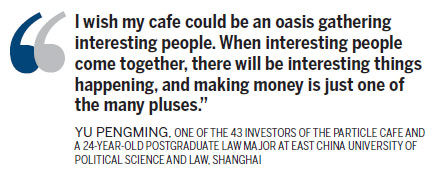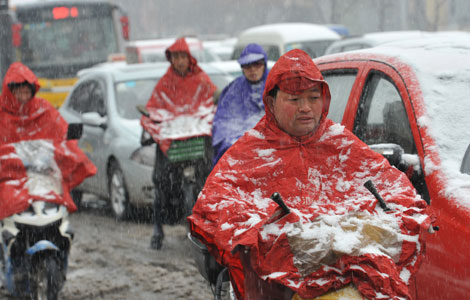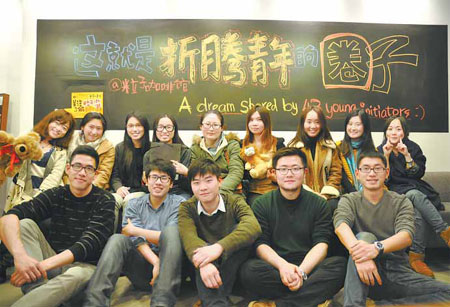A different kind of crowd
Updated: 2013-04-22 07:14
By Xu Junqian in Shanghai (China Daily)
|
||||||||
|
Some of the 43 shareholders of Particle Cafe in Shanghai, who believe realizing dreams is more important than making money, hope the cafe could be a platform for metropolitan citizens to share their stories and dreams. Provided to China Daily |

Small strides help wannabe cafe bosses realize big dreams
Owning a charming little cafe/bar/bistro that serves coffee has always been a fantasy in the largely tea-drinking China for decades, especially after the first cup of green-mermaid-labeled coffee made its debut in the bustling metropolises.
But change seems to be in the air as a growing number of cafes, promoted by young wannabes with hardly any experience, requisite capital or skills are springing up across Beijing, Shanghai and Guangzhou, fueled largely by the entrepreneurial spirit. The common thread that links these cafes is the joint ownership, rather than the thronging crowds one would expect at these establishments.
While the idea of crowd-funding, an alternate approach for start-ups to get investment by pooling money from individuals, is rather strange in China, (there are just four crowd-funding platforms, or websites in the country according to an Economist article in June 2012), many from the post 80s generation in China are bringing their cafe dream to fruition with a similar approach, though few have hardly heard about it.
"It's more about realizing dreams, than making money," said Yu Pengming, a 24-year-old postgraduate law major at East China University of Political Science and Law in Shanghai.
With another 42 classmates, friends, friends' classmates and mostly, strangers summoned online, Yu is one of the latest "cafe bosses" joining the crowd of "opening a many people's cafe", an idea ignited by an online notice written by a Beijing-based girl in early 2011.
"Sitting in front of the computer, against the sunshine in the office, every day, I had always dreamed about serving a cup of coffee to someone in the sunshine, though I barely drink it myself, the notice said and urged like-minded individuals to to start a cafe with 2,000 yuan ($321)," Yu said.
Like a little spark, the posting has served as the ideal tonic for several such cafe start-up ventures.
"We raised 1,000,000 yuan in less than two months, much faster than we expected," said Yu, who, with another two boys, is one of the earliest initiators, and now "chief executives" of the Shanghai cafe, which they named Particle Cafe, because "the universe is made up of small but essential particles, like every shareholder of the cafe".
Covering a two-floor space of 100 square meters in a bustling neighborhood adjoining some office buildings, the cafe is share-held by 43 youngsters who vary in ages from 16 to 28 and have contributed 3,000 yuan to 100,000 yuan to "realize their dreams". Most of them have jobs, or are students, with nothing other than the "glorious cafe boss" title.
"Business has been doing well since we opened in November," said Yu. A cup of coffee is sold at 32 yuan at his dream store.
But in Beijing's Our Cafe, the first such venture, which opened a year earlier than the Shanghai cafe, in a basement, things are not as hunky dory as one would expect.
Some shareholders have exited the project, as it is yet to make a profit. Operating costs have however risen sharply, while the number of customers is constantly fluctuating, especially after the curiosity and novelty of a many people's cafe has faded.
"The best-case scenario is that we will start making money in mid 2014," says Wang Hai, one of the shareholders of the Beijing cafe.
In Xiamen, East China's Fujian province, and Zhongshan, in South China's Guangdong province, the economically most sensitive and competitive areas in the country, the cafe dream is on the brink of being shattered because of the joint efforts.
In Xiamen, the cafe that was co-funded by 80 young people, with minimum individual contributions of 2,000 yuan, the original beautiful garden villa has given way to a restaurant after a year of deficit.
While the slack business and as a result, low turnover, is the main cause for the deficit, Xiao Fang, one of the 80 shareholders who quit even before the cafe was closed down in March, said that he gave up the dream of being a cafe boss because everyone thinks he has a say in the business, but it turns out that nobody can agree on a final say, and thus nobody enjoys the boss privilege.
In Zhongshan, the 104 shareholders of the local Our Cafe resolved to cut the number of decision-makers to eight, after the cafe "burnt up the initial 400,000-yuan investment for nothing" during the first two months since it opened and has been struggling to make profits.
Lin Minshu, an economics professor at the Xiamen University, says that while the idea of crowd-funding sounds very "dreamy", it also involves a lot of risks that could be fatal for start-ups.
The difficulty in getting consensus from a crowd, coupled with the low level of motivation to solve problems due to small amount of capital invested are enough reasons to kill a micro-business, Lin said. He believes that crowd funding does not reduce the failure risks for start-up businesses, and does not also ensure a good start.
But Yu, the Shanghai cafe co-owner, is optimistic about his dream business, which he positions as the "opposite of Starbucks".
"I wish my cafe could be an oasis gathering interesting people. When interesting people come together, there will be interesting things happening, and making money is just one of the many pluses," he said.
xujunqian@chinadaily.com.cn
(China Daily 04/22/2013 page15)

 Obama celebrates young inventors at science fair
Obama celebrates young inventors at science fair
 Earth Day marked around the world
Earth Day marked around the world
 Volunteer team helping students find sense of normalcy
Volunteer team helping students find sense of normalcy
 Ethnic groups quick to join rescue efforts
Ethnic groups quick to join rescue efforts
 Earthquake leaves family shattered
Earthquake leaves family shattered
 Boston Marathon bombing suspect charged
Boston Marathon bombing suspect charged
 Chasing vestiges of the Great Wall
Chasing vestiges of the Great Wall
 Weekly Photos: April 15-21
Weekly Photos: April 15-21
Most Viewed
Editor's Picks

|

|

|

|

|

|
Today's Top News
Russia criticizes US reports on human rights
China 'aims to share its dream with world'
Chinese president appoints 5 new ambassadors
Nation's IPR suits see spike in 2012
H7N9 not spread between humans: WHO
Health new priority for quake zone
Sino-US shared interests emphasized
China, ROK criticize visits to shrine
US Weekly

|

|







